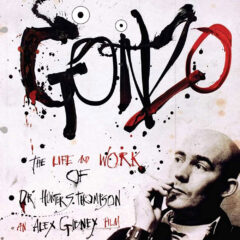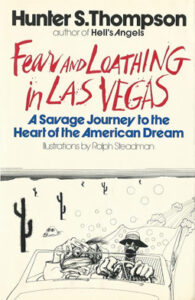
Hunter S. Thompson is much more than just Fear and Loathing in Las Vegas. I knew that, but knowing that isn’t the same as knowing the wider breadth and depth of that statement. Alex Gibney’s 2008 documentary “Gonzo” filled in a few gaps for me, but for those uninitiated it may just enlighten you to just how much more than one book Hunter was.
Gibney does an amazing job throughout the documentary weaving Thompson’s words with his life. As a writer, even one like Hunter, not everything is relevant, yet it all could be usable depending on the story you want to tell.
It feels like a fair and balanced account of the life and times of Hunter S. Thompson. The most striking thing for me was hearing Hunter in his own words and having them compared with Johnny Depp’s reading of certain passages from some of his works.
Many are familiar with Depp’s leading role in the film adaptation of Fear and Loathing in Las Vegas, so to have Depp and Hunter in the same doc seems appropriate. Fear and Loathing in Las Vegas is a seminal work, but it’s certainly not his only one.

Honestly, I come at this as someone who almost became a journalist. I also follow the idea of journalism as much as some follow the news that journalists report. I am also a fan of George Plimpton’s work, who one could argue pioneered participatory journalism. Even with George Plimpton as a pioneer, Hunter is an enigma to be sure. These aren’t just journalists that had experiences and lived to tell the tale. They had the ability to hold a narrative and convey a feeling with their words. In my mind, as far as participatory journalism is concerned, Plimpton and Thompson are 1 and 1a.
But this documentary shed some light behind the scenes of Hunter S. Thompson. Prolific writer Tom Wolfe said, “Hunter reminds me so much of Mark Twain. He was a reporter–Twain started out as a reporter–with a wild imagination and he’s not trying to fool you. You know immediately that he is filtering reality through what Hunter called ‘Gonzo.’”
That feels like an apt conclusion to draw, but for me, the most mind blowing thing I learned from this documentary comes from a Thompson biographer Douglas Brinkley. In the doc, he says that, “The Great Gatsby” is how Hunter learned to write. He would type “The Great Gatsby” over and over again just to learn the music of Fitzgerald. “The Great Gatsby” was filled with anger that the whole deal in American life was rigged. Hunter identified with Fitzgerald I’d say more than any other writer. The difference is Fitzgerald would look in on the candy store window, look in on the storefronts of the rich. Hunter wanted to smash the windows.

Speaking of music, I would be remiss if I didn’t mention that this might be one of the best soundtracked documentaries I’ve ever experienced that isn’t already a music documentary by itself. Honoring Hunter and soundtracking the documentary are James Booker, Bob Dylan, Jefferson Airplane, The Yardbirds, Big Brother and the Holding Company, The Rolling Stones, John Fogerty, James Brown, Howlin’ Wolf, and Jimmy Buffett.
So what is it about Thompson that makes him, well, him? The documentary doesn’t hold up a spotlight or magnifying glass to the man. It does shed more light on it than you probably would get from reading his words, but that’s really where it all is. This documentary is great, but it owes a lot to the written words of Hunter S. Thompson, which is exactly where you should turn if you are interested in this documentary or even after you watch it.
Remember, though, there’s a lot more published works than just Fear and Loathing in Las Vegas for you to choose from.
Read the Secret File of technical information and quotes from Gonzo.